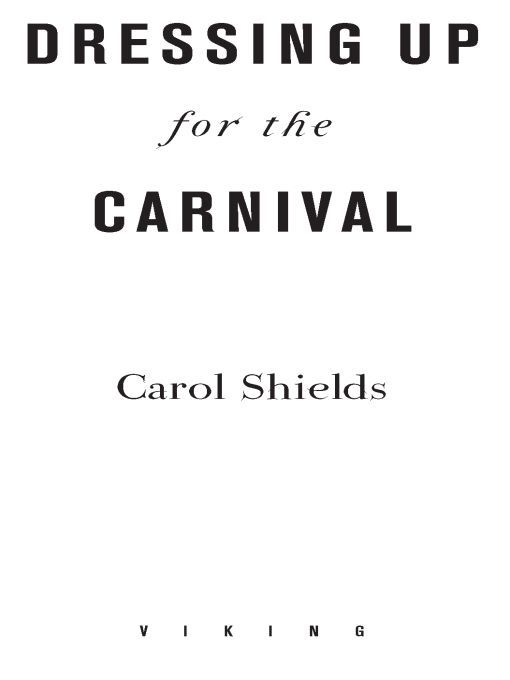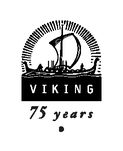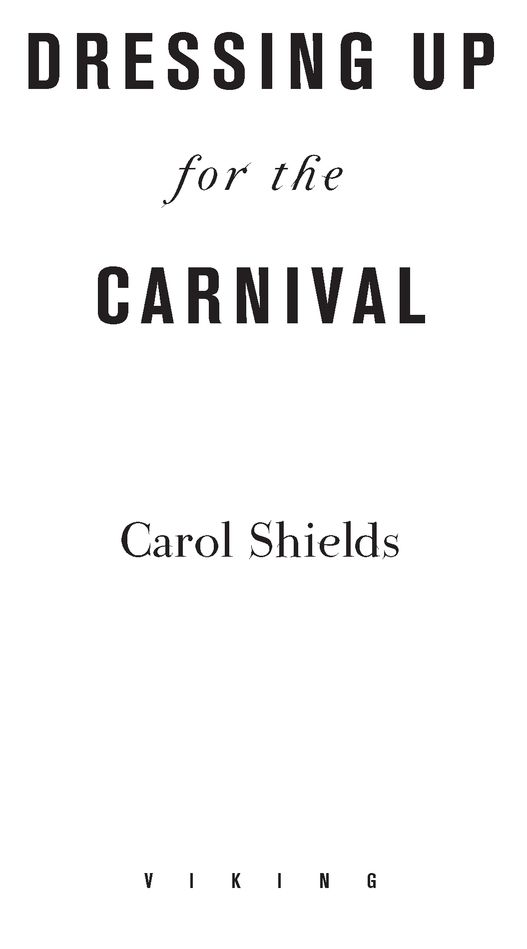Dressing Up for the Carnival
Read Dressing Up for the Carnival Online
Authors: Carol Shields


Table of Contents

THE WORK OF CAROL SHIELDS
POETRY
Others
Intersect
Coming to Canada
Others
Intersect
Coming to Canada
NOVELS
Small Ceremonies
The Box Garden
Happenstance
A Fairly Conventional Woman
Swann
A Celibate Season
(written with Blanche Howard)
The Republic of Love
The Stone Diaries
Larry’s Party
Small Ceremonies
The Box Garden
Happenstance
A Fairly Conventional Woman
Swann
A Celibate Season
(written with Blanche Howard)
The Republic of Love
The Stone Diaries
Larry’s Party
STORY COLLECTIONS
Various Miracles
The Orange Fish
Various Miracles
The Orange Fish
PLAYS
Departures and Arrivals
Thirteen Hands
Fashion, Power, Guilt
(with Catherine Shields)
Anniversary
(with David Williamson)
Departures and Arrivals
Thirteen Hands
Fashion, Power, Guilt
(with Catherine Shields)
Anniversary
(with David Williamson)
CRITICISM
Susanna Moodie: Voice and Vision
Susanna Moodie: Voice and Vision

VIKING
Published by the Penguin Group
Penguin Putnam Inc., 375 Hudson Street,
New York, New York 10014, U.S.A.
Penguin Books Ltd, 27 Wrights Lane,
London W8 5TZ, England
Penguin Books Australia Ltd, Ringwood,
Victoria, Australia
Penguin Books Canada Ltd, 10 Alcorn Avenue,
Toronto, Ontario, Canada M4V 3B2
Penguin Books (N.Z.) Ltd, 182-190 Wairau Road,
Auckland 10, New Zealand
Published by the Penguin Group
Penguin Putnam Inc., 375 Hudson Street,
New York, New York 10014, U.S.A.
Penguin Books Ltd, 27 Wrights Lane,
London W8 5TZ, England
Penguin Books Australia Ltd, Ringwood,
Victoria, Australia
Penguin Books Canada Ltd, 10 Alcorn Avenue,
Toronto, Ontario, Canada M4V 3B2
Penguin Books (N.Z.) Ltd, 182-190 Wairau Road,
Auckland 10, New Zealand
Penguin Books Ltd, Registered Offices:
Harmondsworth, Middlesex, England
Harmondsworth, Middlesex, England
All rights reserved
“Dressing Up for the Carnival” appeared in
Malahat Review;
“Weather,” “The
Harp,” and “Keys” in
Story;
“Dying for Love” and “Soup du Jour” in
West Coast
Review;
“Ilk,” “Mirrors,” and “Reportage” in
Prairie Fire;
“Our Men and Women” in
North Dakota Quarterly;
“Absence” and “Death of an Artist” in
Event;
“New Music”
in
BBC Music Magazine;
“The Next Best Kiss” in
Atlantic Monthly;
“A Scarf ” in
The Financial Post Magazine;
and “Dressing Down” in
Saturday Night.
“Flatties:
Their Various Forms and Uses” was published in a chapbook for the Harborfront
International Writers Festival; “Stop!” in a chapbook,
Drop Out;
and “Eros” in an
anthology,
Feeling the Heat
(Douglas & McIntyre, Vancouver).
Malahat Review;
“Weather,” “The
Harp,” and “Keys” in
Story;
“Dying for Love” and “Soup du Jour” in
West Coast
Review;
“Ilk,” “Mirrors,” and “Reportage” in
Prairie Fire;
“Our Men and Women” in
North Dakota Quarterly;
“Absence” and “Death of an Artist” in
Event;
“New Music”
in
BBC Music Magazine;
“The Next Best Kiss” in
Atlantic Monthly;
“A Scarf ” in
The Financial Post Magazine;
and “Dressing Down” in
Saturday Night.
“Flatties:
Their Various Forms and Uses” was published in a chapbook for the Harborfront
International Writers Festival; “Stop!” in a chapbook,
Drop Out;
and “Eros” in an
anthology,
Feeling the Heat
(Douglas & McIntyre, Vancouver).
PUBLISHER’S NOTE
These selections are works of fiction. Names, characters, places, and incidents
either are the product of the author’s imagination or are used fictitiously, and
any resemblance to actual persons, living or dead, business establishments,
events, or locales is entirely coincidental.
These selections are works of fiction. Names, characters, places, and incidents
either are the product of the author’s imagination or are used fictitiously, and
any resemblance to actual persons, living or dead, business establishments,
events, or locales is entirely coincidental.
LIBRARY OF CONGRESS CATALOGING IN PUBLICATION DATA
Shields, Carol.
Dressing up for the carnival / Carol Shields.
p. cm.
Shields, Carol.
Dressing up for the carnival / Carol Shields.
p. cm.
eISBN : 978-1-101-16185-2
Without limiting the rights under copyright reserved above, no part of this
publication may be reproduced, stored in or introduced into a retrieval system, or
transmitted, in any form or by any means (electronic, mechanical, photocopying,
recording or otherwise), without the prior written permission of both the copyright
owner and the above publisher of this book.
publication may be reproduced, stored in or introduced into a retrieval system, or
transmitted, in any form or by any means (electronic, mechanical, photocopying,
recording or otherwise), without the prior written permission of both the copyright
owner and the above publisher of this book.
For Evan, Eli, and Rebecca
DRESSING UP FOR THE CARNIVAL
All over town people are putting on their costumes.
Tamara has flung open her closet door; just to see her standing there is to feel a squeeze of the heart. She loves her clothes. She
knows
her clothes. Her favorite moment of the day is
this
moment, standing at the closet door, still a little dizzy from her long night of tumbled sleep, biting her lip, thinking hard, moving the busy hangers along the rod, about to make up her mind.
knows
her clothes. Her favorite moment of the day is
this
moment, standing at the closet door, still a little dizzy from her long night of tumbled sleep, biting her lip, thinking hard, moving the busy hangers along the rod, about to make up her mind.
Yes! The yellow cotton skirt with the big patch pockets and the hand detail around the hem. How fortunate to own such a skirt. And the white blouse. What a blouse! Those sleeves, that neckline with its buttoned flap, the fullness in the yoke that reminds her of the morris dancers she and her boyfriend Bruce saw at the Exhibition last year.
Next she adds her new straw belt; perfect. A string of yellow beads. Earrings of course. Her bone sandals. And bare legs, why not?
She never checks the weather before she dresses; her clothes
are
the weather, as powerful in their sunniness as the strong, muzzy early morning light pouring into the narrow street by the bus stop, warming the combed crown of her hair and fueling her with imagination. She taps a sandaled foot lightly on the pavement, waiting for the number 4 bus, no longer just Tamara, clerk-receptionist for the Youth Employment Bureau, but a woman in a yellow skirt. A passionate woman dressed in yellow. A Passionate, Vibrant Woman About To Begin Her Day. Her Life.
are
the weather, as powerful in their sunniness as the strong, muzzy early morning light pouring into the narrow street by the bus stop, warming the combed crown of her hair and fueling her with imagination. She taps a sandaled foot lightly on the pavement, waiting for the number 4 bus, no longer just Tamara, clerk-receptionist for the Youth Employment Bureau, but a woman in a yellow skirt. A passionate woman dressed in yellow. A Passionate, Vibrant Woman About To Begin Her Day. Her Life.
Roger, aged thirty, employed by the Gas Board, is coming out of a corner grocer’s carrying a mango in his left hand. He went in to buy an apple and came out with
this
. At the cash register he refused a bag, preferring to carry this thing, this object, in his bare hand. The price was $1.29. He’s a little surprised at how heavy it is, a tight seamless leather skin enclosing soft pulp, or so he imagines. He has never bought a mango before, never eaten one, doesn’t know what a mango tastes like or how it’s prepared. Cooked like a squash? Sliced and sugared like a peach? He has no intention of eating it, not now anyway, maybe never. Its weight reminds him of a first-class league ball, but larger, longer, smooth skinned, and ripely green. Mango, mango. An elliptical purse, juice-filled, curved for the palm of the human hand, his hand.
this
. At the cash register he refused a bag, preferring to carry this thing, this object, in his bare hand. The price was $1.29. He’s a little surprised at how heavy it is, a tight seamless leather skin enclosing soft pulp, or so he imagines. He has never bought a mango before, never eaten one, doesn’t know what a mango tastes like or how it’s prepared. Cooked like a squash? Sliced and sugared like a peach? He has no intention of eating it, not now anyway, maybe never. Its weight reminds him of a first-class league ball, but larger, longer, smooth skinned, and ripely green. Mango, mango. An elliptical purse, juice-filled, curved for the palm of the human hand, his hand.
He is a man of medium height, burly, divorced, wearing an open-necked shirt, hurrying back to work after his coffee break. But at this moment he freezes and sees himself freshly: a man carrying a mango in his left hand. Already he’s accustomed to it; in fact, it’s starting to feel lighter and drier, like a set of castanets which has somehow attached itself to his left arm. Any minute now he’ll break out into a cha-cha-cha right here in front of the Gas Board. The shriveled fate he sometimes sees for himself can be postponed if only he puts his mind to it. Who would have thought it of him? Not his ex-wife Lucile, not his co-workers, not his boss, not even himself.
And the Borden sisters are back from their ski week in Happy Valley. They’ve been back for a month now, in fact, so why are they still wearing those little plastic ski passes on the zipper tabs of their jackets? A good question. I SKIED HAPPY MOUNTAIN these passes say. The Bordens wear them all over town, at the shopping center, in the parking lot. It’s spring, the leaves are unfolding on the hedges in front of the post office, but the Borden girls, Karen and Sue, still carry on their bodies, and in their faces too, the fresh wintry cold of the slopes, the thrill of powder snow and stinging sky. (The air up there chimes with echoes, a bromide of blue.) It would be an exaggeration to say the Borden sisters swagger; it would be going too far. They move like young ponies, quivery and thoughtful, with the memory of expended effort and banked curves. They speak to each other in voices that are loud and musical, and their skin, so clear, pink, bright, and healthy, traps the sunshine beneath its surface. With one hand, walking along, they stroke the feathering-out tops of hedges in front of the post office, and with the other they pull and tug on those little plasticized tags—I SKIED HAPPY MOUNTAIN. You might say it’s a kind of compulsion, as though they can’t help themselves.
And then there’s Wanda from the bank who has been sent on the strangest of errands. It happened in this way: Mr. Wishcourt, the bank manager where Wanda works, has just bought a new baby carriage for his wife, or rather, for their new baby son, Samuel James. The baby carriage was an impulsive lunch-hour purchase, he explains to Wanda, looking shamefaced but exuberant: an English pram, high-wheeled, majestically hooded, tires like a Rolls-Royce, a beauty, but the fool thing, even when folded up, refuses to fit in the back of his Volvo. Would she object? It would take perhaps three-quarters of an hour. It’s a fine day. He’ll draw her a plan on a sheet of paper, put an X where his house is. He knows how she loves walking, that she gets restless in the afternoon sometimes, sitting in her little airless cage. He would appreciate it so much. And so would his wife and little Sam. Would she mind? He’s never before asked her to make coffee or do personal errands. It’s against his policy, treating his employees like that. But just this once?
Wanda sets off awkwardly. She is, after all, an awkward woman, who was formerly an awkward girl with big girlish teeth and clumsy shoulders. The pram’s swaying body seems to steer her at first, instead of
her
steering
it
. Such a chunky rolling oblong, black and British with its wambling, bossy, outsized keel. “Excuse me,” she says, and “Sorry.” Without meaning to, she forces people over to the edge of the sidewalks, crowds them at the street corners, even rubs up against them with the big soft tires.
her
steering
it
. Such a chunky rolling oblong, black and British with its wambling, bossy, outsized keel. “Excuse me,” she says, and “Sorry.” Without meaning to, she forces people over to the edge of the sidewalks, crowds them at the street corners, even rubs up against them with the big soft tires.
All she gets back are smiles. Or kindly little nods that say: “It’s not your fault” or “How marvelous” or “What a picture!” After a bit she gets the hang of steering. This is a technical marvel she’s pushing along, the way it takes the curbs, soundlessly, with scarcely any effort at all. Engineering at its most refined and comical. Her hands rest lightly on the wide white handlebar. It might be made of ivory or alabaster or something equally precious, it’s so smooth and cool to the touch.
By the time Wanda reaches Pine Street she feels herself fully in charge. Beneath the leafy poplars, she and the carriage have become a single entity. Gliding, melding, a silvery hum of wheels and a faint, pleasing adhesive resistance as the tires roll along suburban asphalt. The weight of her fingertips is enough to keep it in motion, in control, and she takes the final corners with grace. Little Sam is going to love his new rolling home, so roomy and rhythmic, like a dark boat sailing forward in tune with his infant breathing and the bump-dee-bump of his baby heart.
She stops, leans over, and reaches inside. There’s no one about; no one sees her, only the eyes inside her head that have rehearsed this small gesture in dreams. She straightens the blanket, pulling it smooth, pats it into place. “Shhh,” she murmurs, smiling. “There, there, now.”
Other books
In Sickness and in Death by Jaye P. Marshall
Vanished in the Dunes by Allan Retzky
A Dark Night's Work by Elizabeth Gaskell
A Great Catch by Lorna Seilstad
[Churchminster #3] Wild Things by Jo Carnegie
Born Into Love by LaClaire, Catherine
You Belong to Me by Johanna Lindsey
The Last Empire by Plokhy, Serhii
Foreign Correspondence by Geraldine Brooks